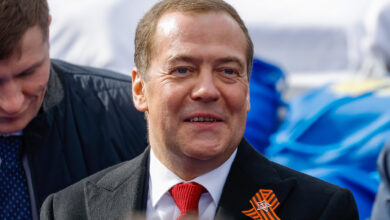The Hague, Netherlands – Judges at the International Criminal Court were to announce Monday whether they will order the arrest of Libyan leader Moammar Gadhafi and two of the most feared members of his regime on charges of crimes against humanity.
Prosecutor Luis Moreno-Ocampo accuses Qadhafi and his forces of opening fire on demonstrators, shelling funeral processions and using snipers to kill people leaving mosques in the early days of the crackdown on rebels fighting to topple Qadhafi from power.
Prosecutors now believe those early attacks were just the start of atrocities by pro-Qadhafi forces.
"Crimes continue today in Libya," Moreno-Ocampo said in a statement. "To stop the crimes and protect civilians in Libya, Qadhafi must be arrested."
If the court issues arrest warrants, it will turn Qadhafi, his son Saif al-Islam Qadhafi and intelligence chief Abdullah al-Sanoussi into internationally wanted suspects, potentially complicating any efforts to mediate an end to more than four months of intense fighting in the North African nation.
Qadhafi appeared to make a significant concession Sunday when African Union leaders meeting in Pretoria, South Africa said he has agreed not to take part in negotiations to end the turmoil.
However in Tripoli, Qadhafi's regime remained defiant. Government spokesman Moussa Ibrahim said Qadhafi is in "high spirits" and remains in day-to-day control of the country. He insisted Qadhafi will remain in Libya.
While issuing international arrest warrants would be a significant step toward bringing Qadhafi to The Hague to face justice, the court has no police force and a patchy record on detaining suspects.
The court's best chance of detaining Qadhafi appears to be if rebels supported by NATO airstrikes win the battle for control of Libya, manage to arrest the longtime leader and agree to extradite him to stand trial.
In the court's only other case against a head of state, judges have twice issued international arrest warrants for Sudanese leader Omar al-Bashir on charges of genocide, crimes against humanity and war crimes in Darfur, but he remains free nearly a year after the second warrant was issued and has flown several times to friendly nations without being arrested.
The court also ordered the arrest of Joseph Kony, and other leaders of the notorious Ugandan rebel group the Lord's Resistance Army, more than five years ago, but they all remain at large.
The case against Qadhafi has surged forward at an unprecedented pace at the world's first permanent war crimes tribunal, where even preliminary investigations can take years.
On 26 Februrary, the United Nations Security Council ordered the court to investigate crimes in Libya. Just days later, Moreno-Ocampo opened an official investigation and on 16 May he asked for arrest warrants for Qadhafi, his son and al-Sanoussi, accusing them of using their unfettered power to stamp out dissent.
Moreno-Ocampo said in May that Qadhafi's forces were imprisoning and torturing dissidents before making them "disappear."
"These are not just crimes against Libyans, they are crimes against humanity as a whole," he said.
Moreno-Ocampo also has signaled further investigations of widespread rapes by pro-Qadhafi forces and war crimes committed by both sides of the conflict as well as attacks on Africans wrongly perceived by rebels to be mercenaries fighting for Qadhafi.
"There will be no impunity for such crimes in Libya," Moreno-Ocampo said.




